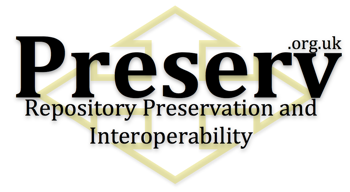

|
Latest...
|
|
Project Partners PRESERV 2 is funded by JISC within its capital programme in response to the September 06 call (Circular 04/06), Repositories and Preservation strand PRESERV was originally funded by JISC within the 4/04 programme Supporting Digital Preservation and Asset Management in Institutions, theme 3: Institutional repository infrastructure development MORE INFORMATION? EMAIL: Steve Hitchcock, Project Manager TEL: +44 (0)23 8059 3256 FAX: +44 (0)23 8059 2865 PRESERV Project, IAM (Intelligence, Agents, Multimedia) Group, Department of Electronics & Computer Science, University of Southampton, Highfield, Southampton SO17 1BJ, UK |
| Storage |
|
Local disk-based storageLocal disk storage is the most basic and common form of storage. The operating system and overlaying software manage files and file locations on physical disks. The only level of abstraction available at this level is that the disk storage may be presented to the operating system as a single disk even though there may be several disks, e.g. in a RAID configuration. RAID is capable of providing some resilience if monitored closely for failures, but should always be backed up on to tape as most disk-based solutions are located in a single building and room and are thus vulnerable to natural disasters such as fire. Disk storage in general suffers from lack of expandability, especially when the repository will only store objects in a single location on disk and cannot add multiple locations later.Pros
|
| <--- Storage options: open storage | 4/5 | Storage - conclusions and future ---> |







